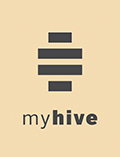Organic honey from the city
myhive Twin Towers literally becomes a beehive – with busy bees!
myhive Twin Towers literally becomes a beehive – with busy bees!
Organic honey from the city
"Dear myhive community,
Bees, bumblebees, butterflies et. al. are indispensable. But unfortunately, in regions with intensive agriculture they face growing difficulties in finding nourishment. To protect those busy bees, the Stadtimker-Initiative was started. It aims at providing better survival conditions in the city for decreasing bee populations and vanishing species of bees – in hope of replacing such bee populations back into a healthy rural environment in a few years. We want to participate in this initiative as sustainability and protection of the natural environment have high priority for us.
The city’s beekeepers always search for appropriate sites for their bee colonies. The myhive Twin Towers are a great opportunity as they meet all relevant criteria regarding place, climate and botany. As such, we drafted a concept together with the city’s beekeepers to make our myhive usable for their bees.
For all of you who haven’t yet noticed: The name myhive is deducted from a bee hive. There, bees not only work very busily in their honeycombs, but they also feel well there and so excellently mirror modern business environments. That’s why those busy animals should also have a place in our myhive community.
Organic honey from the city – in top quality!
The bees are kept according to the rules for organic agriculture and here find nourishment in abundance: They fly to various plants in the nearby relax zone Wienerberg where a great plenitude of trees, bushes and other plants is available. The whole place is dedicated as an official landscape protection zone with a multi-faceted fauna and flora around the Wienerberg pond.
Average temperatures here are 2-3 °C higher, and bees prefer a warm climate: here they start flying out earlier in spring and remain longer active in fall. Their food plants comprise snowdrops in early spring as well as goldenrods in November. Honey from the city contains no residues, meaning substances like fine dust or other pollutants have never been detected. Our city honey is organic and offers top quality – and due to the variety of plants it is much more aromatic than honey from monocultures.
For us, it’s a pleasure to support this initiative and to offer a pleasant home to the bees in the ambient of the myhive Twin Towers.
Your community manager
Julia JacobsDear myhive community,
Bees, bumblebees, butterflies et. al. are indispensable. But unfortunately, in regions with intensive agriculture they face growing difficulties in finding nourishment. To protect those busy bees, the Stadtimker-Initiative was started. It aims at providing better survival conditions in the city for decreasing bee populations and vanishing species of bees – in hope of replacing such bee populations back into a healthy rural environment in a few years. We want to participate in this initiative as sustainability and protection of the natural environment have high priority for us.
The city’s beekeepers always search for appropriate sites for their bee colonies. The myhive Twin Towers are a great opportunity as they meet all relevant criteria regarding place, climate and botany. As such, we drafted a concept together with the city’s beekeepers to make our myhive usable for their bees.
For all of you who haven’t yet noticed: The name myhive is deducted from a bee hive. There, bees not only work very busily in their honeycombs, but they also feel well there and so excellently mirror modern business environments. That’s why those busy animals should also have a place in our myhive community.
Organic honey from the city – in top quality!
The bees are kept according to the rules for organic agriculture and here find nourishment in abundance: They fly to various plants in the nearby relax zone Wienerberg where a great plenitude of trees, bushes and other plants is available. The whole place is dedicated as an official landscape protection zone with a multi-faceted fauna and flora around the Wienerberg pond.
Average temperatures here are 2-3 °C higher, and bees prefer a warm climate: here they start flying out earlier in spring and remain longer active in fall. Their food plants comprise snowdrops in early spring as well as goldenrods in November. Honey from the city contains no residues, meaning substances like fine dust or other pollutants have never been detected. Our city honey is organic and offers top quality – and due to the variety of plants it is much more aromatic than honey from monocultures.
For us, it’s a pleasure to support this initiative and to offer a pleasant home to the bees in the ambient of the myhive Twin Towers.
Your community manager
Julia Jacobs"

